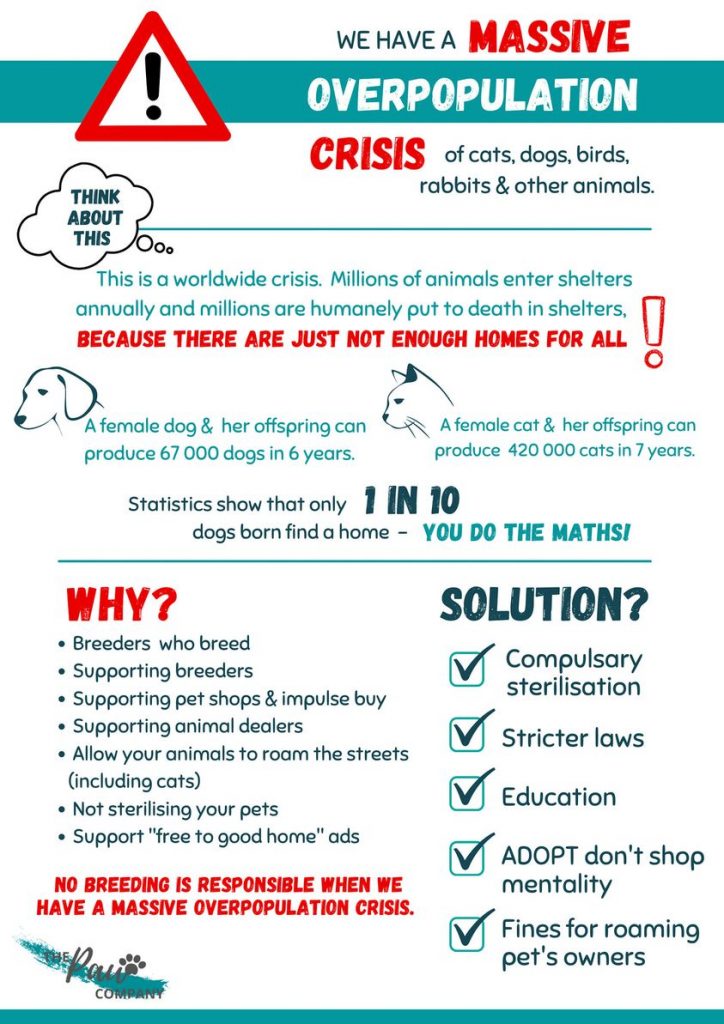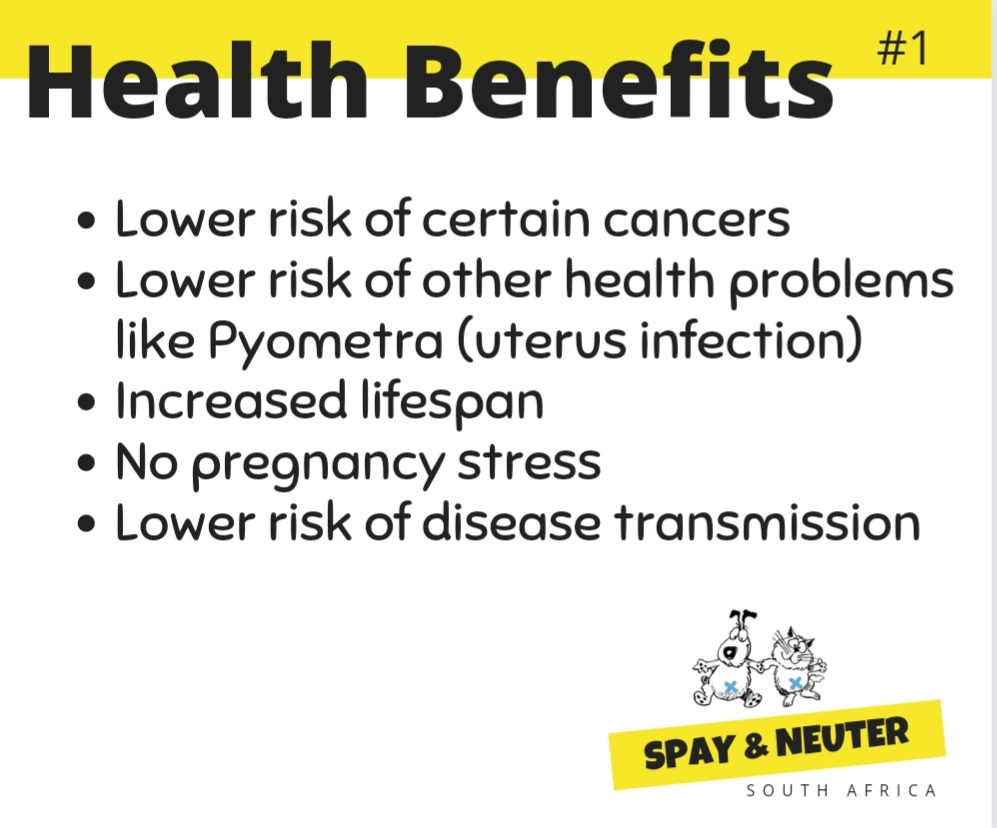
SPAYING AND NEUTERING HAVE MANY BENEFITS, INCLUDING HEALTH, BEHAVIOUR & COMMUNITY BENEFITS.
There are two big reasons why you should spay and neuter your pets. We have a massive pet overpopulation crisis worldwide, with not nearly enough homes, never mind good homes. This means that millions of healthy animals are being euthanized (killed humanely) annually. Another reason is it is good for their health!
THE PET OVERPOPULATION CRISIS
You need to understand the magnitude of this overpopulation crisis and then, hopefully, you will understand why many of us advocate so hard for it.
- One female cat and her offspring can exponentially produce 370 000 cats in just seven years.
- One female dog and her offspring can exponentially produce 67 000 dogs in six years.
- Only 1 out of every 10 dogs born, find a home.
- According to Rescue Rehab SA, approximately 1 million dogs and cats are euthanized in South Africa every year, that is 2740 a day!
- According to the Humane Society of the USA, a cat or dog is euthanized at shelters every 10s.
- A report by Mars Petcare showed 224 million animals are homeless in the USA, UK, SA, Mexico, Greece, Russia, China, India & Germany and about 30% of animals in SA are homeless.
- At least one in four pets brought to shelters are purebred and this number is climbing.
Although we promote adoption, we can’t adopt our way out of this problem, so we need to fix (pardon the pun) it. We have heard all the bad excuses, debunked the myths and I educate about it daily on the SPAY & NEUTER SA page.
One of the worst excuses I have heard is that preventing pets from having litters is unnatural and that if God thought it was a problem he would make them sterile. The fact is that we have already interfered with nature by domesticating dogs, cats and other animals. We domesticated the dog 15 000 years ago and the cat 8 000 years ago. In doing so, we helped create this problem. Now it’s our responsibility to solve it. It’s also unnatural to be killing so many of them in our pounds and shelters each year. You can’t blame the shelters, but you should blame breeders and dealers of any kind.

IT IS GOOD FOR THEIR HEALTH
When you spay and neuter your pets it can lead to longer and happier lives. There are many benefits of spay and neuter for their health which include a lower risk for certain diseases like cancers and pyometra. It certainly eliminates the stress associated with pregnancy. It improves behaviour, especially when dealing with females in heat and males marking or spraying and wandering out of the yard in search of these females which they can smell from far away.

FREQUENTLY ASKED QUESTIONS ABOUT SPAYING & NEUTERING
WHAT DOES SPAY & NEUTER MEAN?
It’s important to recognize the difference between sterilization and desexing (traditional spay and neuter). Whereas the former procedure eliminates a dog’s ability to procreate, desexing sterilizes but also eliminates the dog’s ability to produce sex hormones for the remainder of their life.
Vetcare.com defines it as follows:
The word “spay” refers to the sterilization of female pets. During the ovariohysterectomy, or the typical “spay”, the ovaries, fallopian tubes and uterus are removed from a female dog or cat.
The term “neuter” refers to the castration of male pets. During orchiectomy, or the typical “neuter”, the testes are removed from a male dog or cat.
Both the spay and neuter procedure makes them unable to reproduce and reduces or eliminates breeding-related behaviours. In females it eliminates her heat cycle.
WHAT AGE SHOULD I SPAY/NEUTER MY PET?
An experienced vet can spay and neuter at an age as young as 6-8 weeks old, however, the risks involved with anesthesia may be slightly greater at this age. Older females that are not spayed are at risk too. There is generally no other age limit for the procedure as long as your pet is healthy.
We support spay and neuter at around 6 months of age. We have done so with our pets who all reach ripe old ages and are rarely sick.
SHOULD I LET MY PET HAVE BABIES BEFORE I SPAY THEM?
Most veterinarians and the most recent research recommends that animals are spayed before their first heat cycle (before the age of 7 months or so). This drastically reduces the risk of mammary tumors later in life, prevents uterine infections and unwanted pregnancy. Pregnancy can put unnecessary stress on your pet’s body.
MY PET JUST GAVE BIRTH, HOW LONG SHOULD I WAIT TO SPAY?
Please prevent this, but if it did happen, the suggested time for animals that have recently given birth is about 2 weeks after the young have been weaned and the mother’s milk has dried up.
WHAT ARE SIGNS THAT MY CAT/DOG IS IN HEAT? (Vetcare.com)
Dogs have outward signs of being in heat. The vulva swells, and there is bleeding present for 1-1 ½ weeks. Just after the bleeding stops, most dogs will be receptive to mating for 1-2 weeks. Most dogs will go into heat twice a year, in the spring and fall. Some dogs may skip the fall cycle.
Cats go into heat for the first time typically when they are 5-7 months old. A cat will be in heat (receptive to mating and able to become pregnant) for up to two weeks and then go out of heat. If she has not been mated, two weeks later, she will go back into heat again. This cycling in and out of heat will continue for several months.
Cats can have their first heat cylce at around 4 months of age.
WHAT ARE THE RISKS?
Even though spay and neuter are major surgical procedures, they are some of the most common procedures done by vets. As with any surgery, there are risks associated with anesthesia and potential surgical complications. The overall occurrence of these risks is very rare.
WILL MY PET GAIN WEIGHT?
Probably not. Just like people, pets become overweight when they eat too much or exercise too little. Choosing a diet that is species-appropriate and suited to the health and lifestyle of your pet is important to prevent weight gain.
WILL THEIR BEHAVIOUR CHANGE AFTER THE SURGERY?
The spay and neuter will most likely not alter your pet’s basic personality which is mainly determined by the breed and a few other factors. It can result in some behavioural changes, but usually for the better!
WILL MY MALE CAT STOP SPRAYING IF I GET HIM NEUTERED?
Spraying is common in unneutered male cats. They want to mark their territory and it would be best to neuter your cat before they develop this behaviour. Males may still engage in full-testosterone male behaviors while their male sex hormone levels diminish after surgery. This can take 6-8 weeks. Remember that male rabbits can still be fertile for a few weeks after neutering, as there may be sperm left in the reproductive tract!
DOES SPAYING & NEUTERING HURT?
During a spay or neuter surgery, the animal is fully anesthetized, so they feel no pain. Afterward, some animals seem to experience some discomfort temporarily, but with pain medication, discomfort may not be experienced at all.
HOW LONG DOES IT TAKE TO HEAL?
According to vetcare.com, most spay and neuter skin incisions are fully healed within about 10–14 days, which coincides with the time that stitches or staples, if any, will need to be removed.
WHICH VET TO CHOOSE?
Even though this procedure is a common procedure for vets, not all vets are good at it, so do your homework on the vet! Cats & dogs are common patients, but please use an exotic qualified vet for other animals!
SHOULD ALL ANIMALS BE SPAYED & NEUTERED?
The massive overpopulation crisis includes more than just cats and dogs, so the answer is mostly yes. There might be exceptions due to safety or medical reasons and those animals need highly responsible owners to prevent litters. Spaying or neutering a bird is not a routine surgery like it is with many mammals and can be riskier. There are many other ways to prevent your birds from reproducing offspring. Removing eggs of egg-laying animals (the right way) is another method.
CAN YOU SPAY A FEMALE IN HEAT?
Although possible, most vets will probably advise against it due to more swelling and a higher risk of bleeding. This surgery may take longer and be more expensive.
CAN’T WE JUST SPAY THE FEMALES AS THEY HAVE THE LITTERS?
No darling, it takes two to tango if you missed biology class. The female can only have so many puppies/kittens at once, but the male can impregnate many females around the same time.
IF I KEEP THEM SAFE IN MY YARD, DO I STILL NEED TO SPAY & NEUTER THEM?
Yes, for sure! Do you know that guy called Murphy? Animals get in and out of yards and saying it was an unexpected litter doesn’t fly. If your pet is not spayed or neutered, you can totally expect it.
ARE THERE SPECIFIC PRECAUTIONS TO TAKE AFTER THE PROCEDURE?
Apart from the usual veterinary advice like keeping your pet still and keeping the wound clean, you also need to phone your vet the moment you think something is not right and keep the freshly-neutered males away from non-spayed females for some time.
When it comes to male neuters for various species, after the testicles are removed, it takes time for all of the residual sperm to clear out of the pipes. Ask your vet how long, but some sources suggest days to weeks. During this time, a freshly-neutered male can still impregnate females.
IS THE PROCEDURE EXPENSIVE?
It probably depends on what you spend money on and whether your pet’s health is a priority to you. The cost of spaying or neutering depends on the sex, size, and age of the pet, your veterinarian’s fees, and a few other factors. Remember that spay or neuter surgery is a one-time cost and the cost far outweighs the cost of health-related issues due to not sterilizing or even for raising litters. There are many opportunities to do this at more affordable rates and adoption fees include it!
In general, spaying tends to be more expensive than neutering. Spaying involves opening your dog or cat’s stomach to access the animal’s reproductive organs where neutering is less complex.
The cost may vary from town to town, but according to Pawpawpets.com, the average cost of a spay in South Africa is around R1350 for a female cat and around R1800 to a crazy R4000 for a female dog. Neuters can cost around R750-R1000 for a male cat and around R1200 – R2500 for a male dog.
THE BIGGEST CRITICISM OF EARLY SPAY & NEUTER
There are always two sides to a coin and it is important to look at both.
Some research shows that in desexing spays and neuters – surgical procedures that remove the gonads and associated sex hormones – can have a long-term negative impact on their health.
The research mostly suggest this more in large dog breeds. The advice then is to have them spayed or neutered after they turned one year old, but again then they need a highly responsible owner. You must also remember that the relationship between sex hormones, health and wellness is more complex and can be influenced by many aspects like sex, breed, age, environment and more.
I have not yet seen these negative effects and I think there is more research needed on this as single case studies are not enough. With this massive overpopulation crisis worldwide, the benefits far outweigh the risk for me.
If this does occur, it seems that hormone restoration therapy may be beneficial to symptomatic spayed and neutered dogs.
What are alternatives then?
When a pet is left intact, it requires a highly responsible pet guardian who is fully committed to and capable of preventing mating and litters.
Another option is sterilizing so the testes or ovaries can continue to produce hormones. This can be accomplished through vasectomy and hysterectomy. According to Dr. Karen Becker, traditional spaying and neutering are basically the only techniques vets are currently taught and we need to change that.
Also read how to choose a veterinarian
Changing the fate of animals and the massive overpopulation crisis resolves around three principles namely sterilization, education, stricter and enforced laws for those who don’t respond to being asked nicely. No breeding can be “responsible” when we have a massive overpopulation crisis and when you support breeders, you are part of the problem.
BE PART OF THE SOLUTION AND JOIN THE SPAY & NEUTER REVOLUTION
- Spay & neuter your pets.
- Share, educate & advocate for it.
- Donate to spay & neuter campaigns.
- Support petitions on the topic.
- Don’t support animal dealers, breeders, or pet shops that fuel the overpopulation crisis.
- Adopt from reputable organizations.
Can you see now why reputable animal welfare organizations are all up-in-your-business about spay and neuter? Next week we will look at another big problem……… “free to good home” animals.
WHEN YOU KNOW BETTER, DO BETTER!
I needed to thank you for this fantastic read!! I absolutely enjoyed every bit of it. I have you saved as a favorite to check out new stuff you postÖ
Hi. It is a pleasure. Glad you are enjoying it! We usually publish this feature on Wednesdays.